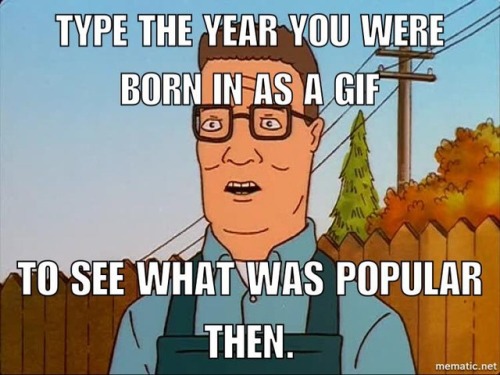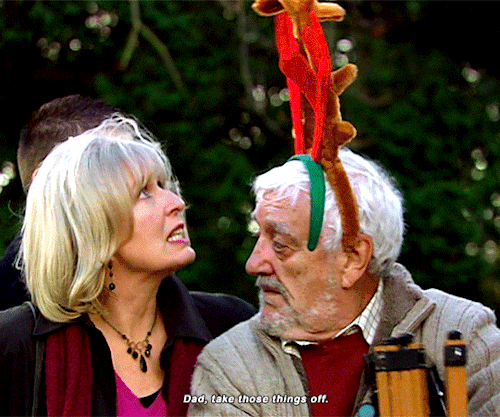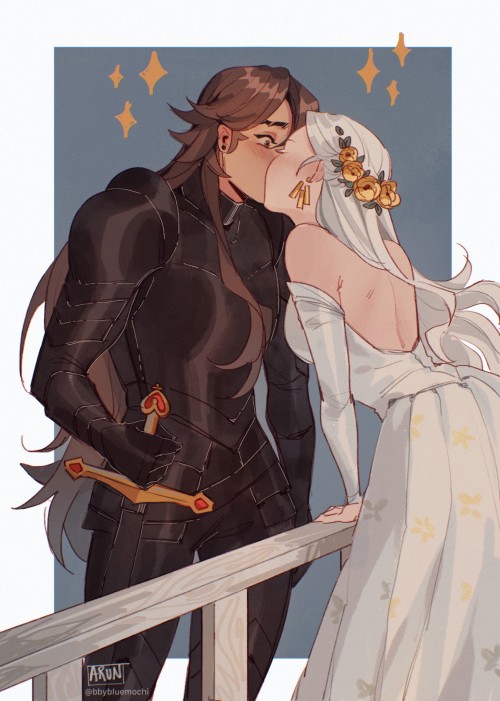Love When He Said This, On The Show


love when he said this, on the show
More Posts from Rebelharkness and Others
@/maxhovey on tiktok



THEY'RE COMING BACK


more lesbian fairytale illustrations I did for my personal project <3
While Donna Noble will always be my favourite companion in NuWho, Clara will always be the most multi-faceted and complex (as of now). I think that a lot of divisiveness surrounding Clara stems from 5 common criticisms:
1. Clara’s characterisation in 7B and how Moffat treats her mostly as a mystery box first and character second.
2. The length of Clara’s tenure and how some may have been fatigued due to the many times “she should have left.”
3. The emphasis on Clara’s flaws in Series 8 and how it kind of paints her as unlikable over her Series 7B depiction as at least kind.
4. Clara’s departure in Hell Bent as something that ruins her ending in Face The Raven.
5. The belief of Clara as the most important character in the Doctors life inherently devaluing other companions.
I think while I can understand the reasons leading up to these criticisms, I also think that it does help to look back throughout the Moffat and RTD era as it does help explain a lot of these points imo.
Actually, the character Clara most prominently echoes is Rose. Rose, like Clara, helped the Doctor through a time of extreme emotional vulnerability (for 9th, Time War trauma) and developed a relationship of co-dependency with him (as 10th) which never really went away even after Doomsday. Clara had the luxury of time however, and has undergone more events with the Doctor (Impossible Girl, Trenzalore, 50th Anniversary etc) but also how 12th was undergoing an extreme identity crisis of figuring out whether he’s a good man post-Trenzalore and saving Gallifrey. Clara was the one who facilitated his character growth through the turbulence of the arc in instances like Dark Water, Death In Heaven, Mummy on The Orient Express, Kill The Moon, Last Christmas etc and would naturally result in the Doctor developing an extremely unhealthy reliance on Clara as being his “carer,” his anchor to being The Doctor (refer to her whole “Be A Doctor” spiel in the 50th Anniversary). Series 9 already heavily implied the Doctor’s willingness to engage with destructive measures by choosing to separate Clara and The Doctor almost every episode (Magicians Apprentice/Witch’s Familiar) as the stakes rose and cumulated in Face The Raven.
RTD has also once said when paying tribute to Moffat:
“And nestling at the heart of the show is Doctor Who's very own problem category, the Companion, a title inherently subordinate to the Man. Until Clara comes along!”
Imo, while poorly phrased, I think does also hit another nail on the head to explain how Clara can be so compelling to someone like me but also extremely polarising. RTD is talking less about the companion being “weaker” or “submissive” but how Clara is the NuWho companion that wishes to obliterate the boundaries between the power dynamic of companion/doctor. Series 8 for instances plays on the recurring motif of, “Do as you are told” which the Doctor firstly uses to threaten Clara to keep her safe. However, Clara actively retaliates by parroting the phrase back in an attempt to attain parity. This escalates to the events of Dark Water where she attempts to maintain control of her circumstances by forcing the Doctor to be on equal ground with her. What is so fascinating is that Clara while changing and emulating more of the Doctor’s heroism, she equally begins to absorb his flaws which intensify throughout Series 8-9. Clara becomes more deceitful, egotistical, reckless and cunning as she begins to become more and more like him. The means she lies to Danny, her ability to think more and more like him.
However, what people (fans and haters) also ignore is how nuanced the circumstances are. While Clara’s flaws become more heightened, it is also a fact that she wants to be like the Doctor because of his kindness and heroism. Episodes like Robots of Sherwood, Last Christmas or even Rings of Akhten reveal a lot about how Clara reveres the Doctor as a mythic and heroic figure. Clara’s attitudes towards the children in Forest Of The Night, Name Of The Doctor and Into The Dalek reveal that in spite of her ego and selfishness, she is someone who desires to help people. Thus, her desire to become the Doctor becomes more explainable. What a lot of people can’t really accept is that she can be both egotistical, reckless and kind at once. Her actions in Face The Raven were driven out of the fact that it came from a place of ignorance and impulsiveness (not stupidity, the Doctor would do something similar, it’s just that Clara did not have all the clues) in what she believed would be what the Doctor would do and that she was confident she could match the trickery of the Doctor, and yet it was also driven by her compassion towards Rigsby and her while impulsive, sincere desire to save her friend.
Clara is punished because of this, she forgets that she’s far too human. The Doctor is less breakable. She pays for it and as Ashildr says in Hell Bent:
“She died for who she was and who she loved. She fell where she stood. It was sad. And it was beautiful.”
She died due to her physical fragility, her ego, her ignorance, her impulsiveness/recklessness and yet she also died because she was too brave, she died like the Doctor, who she loved (literally look at how her arms were outstretched as though she was mid-regeneration and how the black smoke parallels the orange glow of regeneration). However, this leads to the fourth main criticism I prior stated, so how does one answer that in relation to her character?
The answer is what Clara does and what the Doctor says towards the end of Hell Bent. Clara after being extracted and is with the Doctor in the TARDIS, spies on him because she is instantly suspicious of his erratic behaviour. Again, Clara shows how much she has become like him, she immediately picks up that he is hiding something because she has begun to think like him. Of course, the Doctor was planning on wiping Clara’s memories similar to what he did to Donna. But what does Clara do? She immediately reverse the polarity of the device that the Doctor was going to use on her and challenges the Doctors actions. Clara states:
“Tomorrow’s promised to no one, Doctor. But I insist upon my past. I am entitled to that. It’s mine.”
Clara’s language indicates her assertiveness and also a kind of last hurrah in her game of parity. She is refusing to submit to the narrative of being reduced to merely a companion that the Doctor moves away from. But more importantly, the Doctor after pressing the device and is losing his memory, states:
“Run like hell because you always need to. Laugh at everything, because it’s always funny (…) Never be cruel and never be cowardly. And if you ever are, always make amends (…) Never eat pears. They’re too squishy. And they always make your chin wet. That one’s quite important. Write it down.”
I think on initial viewing when the show was airing, this wouldn’t make much sense but this really shows the crux of how Hell Bent completes Clara’s arc and the necessity of her resurrection. In Face The Raven, the Doctor tells Clara that she’s more breakable as she questions why she can’t be as reckless as him. However, now the Doctor is instead telling her what would later be repeated in Twice Upon A Time, his regeneration speech. In his eyes, Clara has succeeded in graduating from the Magicians Apprentice and into becoming the Magician herself. He’s instructing her how to properly be The Doctor. As I said, Clara was also motivated by her desire to be kind when she engaged in her reckless gambit but what is so wrong about the desire to be kind? And why should Clara be punished for it? Thus, while Clara MUST die, her final act of kindness at the end of her arc enables the Universe to allow for Clara’s final transformation into the Doctor.
Clara is still dead, it is an unchanged historical event. However, to challenge the status quo and allow for Clara’s ascension, Clara becomes a fairy tale herself. Her body is caught in a permanent form of stasis, signalling her departure from the limits of her physicality (subverting her physical fragility) but also as seen through her last words to the Doctor:
“You said memories become stories when we forget them. Maybe some of them become songs.”
Clara has successfully become what she admired, a myth, a fable. She has become a symbol in a story, a story that would go on to have an infinite number of other stories. She has become the leaf she raises to the monster in the Rings of Akhten, she sails off into narrative ambiguity but also infinity. Clara is so polarising because she challenges the definition of what it means to be The Doctor on a pure metatextual level. It’s a logical progression from the introspection of the question from the Doctor himself in Series 8. To want to resist, I argue, is natural.
I could explore further about her adrenaline addiction in Mummy On The Orient Express or these traits I raised explored in Flatline which I may do another day, but I hope I have provided a new perspective on Clara Oswald.












to moving forward

…and after defeating Palpatine, the trio got home and had a well deserved nap.
Sources for Somerton's Plagiarism from Hbomberguy's Video (as much as I could get)
I went back through Harry's video, focused entirely on the sources James Somerton pulled from in the hopes of creating as much of a comprehensive list as I could--though my Google-Fu is not very strong. I did however find something I thought was forever lost and that made me very happy--specifically the magazine Midlands Zone containing the column by Steven Spinks that Harry poignantly used as an illustration of gay erasure... while Somerton uses it to sound like HE is waxing remorseful about the very subject.
This is not a complete list, I'm sure. For one thing, I was only able to attempt to pull sources that Harry himself mentioned in the video. Surely there's so very much more out there. I expect there to be a great deal more internet archeology to unearth just how much writing and culture Somerton has stolen like he's the British Museum of Natural History but for gay people.
- - - - -
Harry's list of mentioned youtubers:
Alexander Avila - https://www.youtube.com/@alexander_avila Matt Baume - https://www.youtube.com/@MattBaume Khadija Mbowe - https://www.youtube.com/@KhadijaMbowe Lady Emily - https://www.youtube.com/@LadyEmilyPresents Shanspeare - https://www.youtube.com/@Shanspeare RickiHirsch - https://www.youtube.com/@RickiHirsch VerilyBitchie - https://www.youtube.com/@verilybitchie
Harry created a convenient playlist of videos by these and other people he wants to bring to everyone's attention.
Please give them your support.
- - - - -
Midlands Zone Magazine - Column by Steven Spinks
After a great deal of searching, I found an archive of the "Midlands Zone" magazine, where you can read through past issues dating all the way back to February 2014. I have also found the issue from which Somerton took Spinks' poignant discussion of gay erasure: Overall archive Specific Issue - Pages 16-17
It will not allow you to download it, but you can read it exactly as it appeared in print form.
- - - - -
My best effort to find the exact book or article Somerton lifted from to be able to get attention to the original writers
Tinker Bells and Evil Queens By Sean Griffin
The Celluloid Closet By Vito Russo Wikipedia article about the book Wikipedia article about the documentary My weak google-fu could not find where you can access the book or documentary. Check your local municipal or university library for book or documentary, or if you know a good source for one or both, please reblog with it added
Camp and the Gay Sensibility By Jack Babuscio
The Groundbreaking Queerness of Disney's Mulan By Jes Tom Personal site with links to social media accounts
Why Rebel Without a Cause was a milestone for gay rights By Peter Howell
Why "The Craft" is still the best Halloween coming out movie By Andrew Park
Opinion: From facehuggers to phallic tails, is 'Alien' one of the queerest films ever? By Dani Leever
Women and Queerness in Horror: Jennifer's Body By Zoe Fortier
[Pride 2019] We Have Such Sights to Show You: Hellraiser and the Spectrum of Queerness By Alejandra Gonzalez
Revealing the Hellbound Heart of Clive Barker's 'Hellraiser' By Colin Arason
Queering James Cameron's Aliens (1986) By Bart Bishop
Demeter and Persephone in space: transformation, femininity, and myth in the 'Alien' films By David Greven
Fears of a millennial masculinity: Scream's queer killers By David Greven (Scholarly site, unable to access original work, offers a way to request a full copy of the text in PDF)
Queer Subtext in Stephen King's It - Part 1: 'Reddie' Character Analysis By Rachel Brands Rachel is the very unfortunate lady who found out she was being stolen from because she supported Somerton through Patreon and saw one of his videos early with her writing--lacking any form of citation or credit
How 'It: Chapter Two' Leaves Richie Tozier Behind By Joelle Monique
When Horror Becomes Strength: Queer Armor in Stephen King's 'IT' By Alex London
Why Queer People Love Witchcraft By Amanda Kohr
'The Favourite' Queers The Past And The Present By Giorgi Plys-Garzotto
(Wuko) Crush (Mako x Wu) By MoonFlower on YouTube
5 Terrible Movies With Awesome Hidden Meanings By J.F. Sargent
The Radicalization of Sexuality: The Queer Casae of Jeffrey Dahmer By Ian Barnard
Netflix's 'Dahmer' backlash highlights ethical issues in the platform's obsession with true crime By Shivani Dubey
The Possible Disturbing Dissonance Between Hajime Isayama's Beliefs and Attack on Titan's Themes Original Article by "Seldom Musings" (Author has made all posts not related to Attack On Titan private and has retired from the blog)
Everyone Loves Attack on Titan. So Why Does Everyone Hate Attack on Titan? By Gita Jackson
- - - - -
The following people are otherwise named in the video. There are no direct citations of articles or books by them in said video. I am unable to guarantee that I have identified the correct individual.
Darren Elliott-Smith Michaela Barton David Church Claire Sisco King Amanda Howell Jessica Roy
- - - - -
Telos announced and cancelled a film likely based on this book: The Final Girl Support Group - By Grady Hendrix
- - - - -
I refrained from including certain sources.
First off only focusing on Somerton's work.
Secondly not including anything that might be visible enough to not require amplifying their voice (I cannot speak for all of those I have found links to, but journalism is frequently a thankless job).
Thirdly any source that is of a nature that is antithetical to the very existence of the queer community, such as the right-leaning source that didn't make it into Somerton's video, but Harry was able to identify as a source he had considered using.
If you feel I have missed a mentioned source--or you know of a source from material that was not covered in Harry's video--please do not hesitate to reblog with added details.
- - - - -
Please share this information far and wide, and please add to it if you find more material that can be positively identified and linked to the creator/writer.
I don't really think skinny people have any sort of grasp on how bad fatphobia is and it's not for lack of trying on fat people's part, skinny people get very vicious when you challenge their privilege
The rumours are true. Well, the good ones are, anyway. Netflix is delighted and thrilled that so many of you, all over the world, have been watching and loving Sandman, which means that the thing we were all hoping would happen...? Well, it's happened...
-
 allhailthedumpsterfire reblogged this · 1 month ago
allhailthedumpsterfire reblogged this · 1 month ago -
 allhailthedumpsterfire liked this · 1 month ago
allhailthedumpsterfire liked this · 1 month ago -
 mypatronusisamiddlefinger reblogged this · 1 month ago
mypatronusisamiddlefinger reblogged this · 1 month ago -
 neversleepuntilfive liked this · 1 month ago
neversleepuntilfive liked this · 1 month ago -
 annoyingcloudearthquake reblogged this · 1 month ago
annoyingcloudearthquake reblogged this · 1 month ago -
 chaoticconnoisseurgiver liked this · 1 month ago
chaoticconnoisseurgiver liked this · 1 month ago -
 chaoticconnoisseurgiver reblogged this · 1 month ago
chaoticconnoisseurgiver reblogged this · 1 month ago -
 pimento-playing-hopscotch liked this · 1 month ago
pimento-playing-hopscotch liked this · 1 month ago -
 psycheetamore reblogged this · 1 month ago
psycheetamore reblogged this · 1 month ago -
 gillys-isle reblogged this · 1 month ago
gillys-isle reblogged this · 1 month ago -
 maya-matlin liked this · 1 month ago
maya-matlin liked this · 1 month ago -
 maya-matlin reblogged this · 1 month ago
maya-matlin reblogged this · 1 month ago -
 yovo liked this · 1 month ago
yovo liked this · 1 month ago -
 chocoholicbec reblogged this · 1 month ago
chocoholicbec reblogged this · 1 month ago -
 chocoholicbec liked this · 1 month ago
chocoholicbec liked this · 1 month ago -
 southern-white-boy liked this · 1 month ago
southern-white-boy liked this · 1 month ago -
 howmanyyams liked this · 1 month ago
howmanyyams liked this · 1 month ago -
 harleyshahas reblogged this · 1 month ago
harleyshahas reblogged this · 1 month ago -
 et3rnal-dr3am3r reblogged this · 1 month ago
et3rnal-dr3am3r reblogged this · 1 month ago -
 et3rnal-dr3am3r liked this · 1 month ago
et3rnal-dr3am3r liked this · 1 month ago -
 urlocalweirdperson1232 reblogged this · 1 month ago
urlocalweirdperson1232 reblogged this · 1 month ago -
 urlocalweirdperson1232 liked this · 1 month ago
urlocalweirdperson1232 liked this · 1 month ago -
 lit-arsonist reblogged this · 1 month ago
lit-arsonist reblogged this · 1 month ago -
 slytherintothedragonsden reblogged this · 1 month ago
slytherintothedragonsden reblogged this · 1 month ago -
 slytherintothedragonsden liked this · 1 month ago
slytherintothedragonsden liked this · 1 month ago -
 fearofpop reblogged this · 1 month ago
fearofpop reblogged this · 1 month ago -
 suddenlyseaweed reblogged this · 1 month ago
suddenlyseaweed reblogged this · 1 month ago -
 phoenixlionme reblogged this · 1 month ago
phoenixlionme reblogged this · 1 month ago -
 origamiecho reblogged this · 1 month ago
origamiecho reblogged this · 1 month ago -
 origamiecho liked this · 1 month ago
origamiecho liked this · 1 month ago -
 silverscribe87 reblogged this · 1 month ago
silverscribe87 reblogged this · 1 month ago -
 knightofarcane liked this · 1 month ago
knightofarcane liked this · 1 month ago -
 sushifresse reblogged this · 1 month ago
sushifresse reblogged this · 1 month ago -
 sushifresse liked this · 1 month ago
sushifresse liked this · 1 month ago -
 jupiter-descending liked this · 1 month ago
jupiter-descending liked this · 1 month ago -
 stevie-nyx reblogged this · 1 month ago
stevie-nyx reblogged this · 1 month ago -
 stevie-nyx liked this · 1 month ago
stevie-nyx liked this · 1 month ago -
 kiwibirbkat liked this · 1 month ago
kiwibirbkat liked this · 1 month ago -
 a-dauntless-daffodil reblogged this · 1 month ago
a-dauntless-daffodil reblogged this · 1 month ago -
 waterbrand101 liked this · 1 month ago
waterbrand101 liked this · 1 month ago -
 garymerlow reblogged this · 1 month ago
garymerlow reblogged this · 1 month ago -
 philcoulson-redtapeninja reblogged this · 1 month ago
philcoulson-redtapeninja reblogged this · 1 month ago -
 philcoulson-redtapeninja liked this · 1 month ago
philcoulson-redtapeninja liked this · 1 month ago -
 leighistired reblogged this · 1 month ago
leighistired reblogged this · 1 month ago -
 he1chouarts reblogged this · 1 month ago
he1chouarts reblogged this · 1 month ago -
 happybird16 reblogged this · 1 month ago
happybird16 reblogged this · 1 month ago -
 f3ytal liked this · 1 month ago
f3ytal liked this · 1 month ago -
 f3ytal reblogged this · 1 month ago
f3ytal reblogged this · 1 month ago -
 ahsokatanoourqueen liked this · 1 month ago
ahsokatanoourqueen liked this · 1 month ago

well you can read so (I have a writing blog on here check it out @rwritingblog)
459 posts